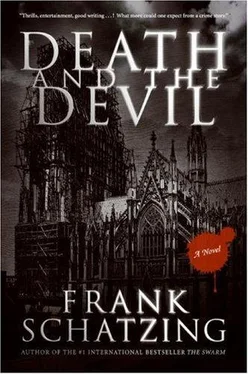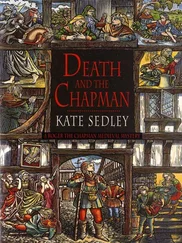“How should I know? Someone with money and influence, I suspect. Someone willing to pay for a silent, invisible executioner, who probably still has an exceptionally difficult task to perform. He buys himself witnesses and on the same evening as the murder manages to get rid of the only two people you told about it. So we have a mind capable of logical planning, rare enough nowadays with the followers of Saint Bernard railing against reason and trying to stop the wheel of time. He’s intelligent, quick, and skillful, probably very strong physically, and an expert shot into the bargain. Now most crusaders were complete blockheads, ergo our murderer must have belonged to the elite.”
“So why does he go around murdering? The Crusade is over. If he’s so clever, why doesn’t he just go home?”
“That,” said Jaspar, “is a good question.”
They had reached the street of Little St. Martin’s. The church was some way down on the left and opposite it, according to Jaspar, the bathhouse where they were to meet Justinius von Singen and Andreas von Helmerode. Jacob had never been in a bathhouse, but at the moment all that interested him was the false witnesses. If he and Jaspar managed to persuade them to change sides, as he fervently hoped they would, and make a statement to the council, then his nightmare might be over and the long-haired monster consigned to the jaws of hell out of which it had crawled. If only—
“Wait,” Jaspar said softly and stopped.
Jacob stumbled on for a step, then turned to face him. “What is it? Why are we stopping?”
Silently Jaspar pointed to an obviously excited gathering outside the bathhouse. A gang of children came running from that direction. As they went past, Jaspar grabbed one by the sleeve.
“Lemme go,” the urchin shouted. Jaspar’s bald pate and long nose seemed to fill him with fear.
“Right away, my son, if you tell us what’s happening down there.”
“Two men’s been done in. Lemme go, I didn’t do nothin’. Lemme go.”
“Stop shouting,” hissed Jaspar and let go of his sleeve. The boy chased after the others as if the Devil were at his heels.
Grasping Jacob by the arm, Jaspar swung around. “We’ve got to get away.”
“But—” Away? Jacob felt his heart sink and looked back.
“Keep walking,” Jaspar commanded. “Behave normally. Don’t hurry.”
“What’s wrong?” asked Jacob, already filled with dread.
“Once again our murderer has been quicker. We stroll along discussing how clever he is, idiots that we are, like lambs to the slaughter, my bald head shining in the sun for all to see.”
Jacob looked back again. Four men, burly types in the dress of house servants, had emerged from the throng and were following them.
“We’re being followed?” asked Jaspar, not turning his head.
“Four,” said Jacob dully.
“Perhaps we’re in luck,” said Jaspar. Jacob took another quick glance behind and saw the men quicken their step. Now they were almost running. “They didn’t count on us turning back like that. Once we’re past the malt mill we’ll split up. You go off to the left, get among the crowds in Haymarket. I’ll take the opposite direction.”
“But where will we—”
“Do you understand, dammit?”
“Yes.”
“I’ll find you somewhere. Now!”
Before Jacob could say anything, Jaspar gave him a push and ran off to the right, through a courtyard toward St. Mary’s. As he spun around, Jacob saw the four men abandon all pretense and set off after them, bawling and shouting.
He dived in among the people thronging the market stalls.
Rolof swore.
He cursed Jaspar’s cook because she had been ill for days and there was no decent food to eat, and he cursed the maid because she hadn’t cooked enough currant porridge that morning before going to stay with her parents out in the country for a week. He cursed the fact that he was the one who had to chop firewood, do the shopping, and clean the house, all on his own, and finally he cursed Jaspar Rodenkirchen, because it had to be someone’s fault. And as he unloaded the big handcart and carried the tub of soused herrings, the sack of peas, the half ounce of ginger, the brown sugar, and the butter into the back, he cursed Jacob, who had eaten some of the porridge he had had to go without, then Richmodis and Goddert, adding, for good measure, the archbishop, the king, and the pope. After that, he couldn’t think of anyone else and he didn’t have the nerve to curse saints.
That didn’t mean that Rolof didn’t love them all, especially Jaspar, Richmodis, and Goddert. Cursing was just his natural reaction to work.
Exhausted by the unloading and the cursing, he wiped the sweat from his brow and rubbed his belly. His eye fell on the handcart, which he had tipped up and leaned against the wall. One of the wheels was squeaking. He wondered whether to do something about it. That would mean more work. More work would mean more cursing, but Rolof regarded the mouth as a place where things went in rather than came out. He looked up at the sun and thought long and hard about what he should do. After a while he came to the conclusion he should do nothing, at least for the moment. With a brief prayer of thanks to the Lord for vouchsafing this insight, he went indoors and sank onto the fireside bench.
Just a moment! Jaspar had mentioned the wood in the yard. Didn’t it need chopping?
Jacob hadn’t chopped any, even though he was supposed to. Surely if it had been that important, Jaspar would have insisted. But he hadn’t. So why should Rolof have to do it? Anyway, he thought it was a waste of fine wood to burn it while the sun was shining and filling the house with natural warmth. No need to bother, then.
But if there was?
You can’t chop wood in your sleep, Rolof thought. Hey, that was a good idea! Get some sleep. He stretched, yawned, and was about to head for the stairs, when there was a knock at the door.
“One thing after another,” he grumbled. Still yawning, he waddled over to the door and opened it.
“The Lord be with you,” said the man with a friendly smile. “Is Jaspar at home?”
Rolof blinked and looked the man up and down. Up meant putting his head right back. The man was tall. He was wearing the black habit of the Dominicans.
“Does he know you?” asked Rolof.
The man raised his bushy brows in astonishment. “But of course. Jaspar and I studied at college together. I haven’t seen him and his bald head for ages. May I come in?”
Rolof hesitated. “Jaspar’s not here, yes?”
“Oh, what a pity. No one at all at home?”
Rolof pondered this. “Yes, there is,” he said slowly. “Me. I think.”
“Perhaps I could wait, then? You see, I’m just passing through and I’m pretty weary. In a couple of hours I’ll have to be going, to say mass in a village outside. It’d be such a shame if I couldn’t at least say hello to the old rogue.”
He beamed at Rolof, who scratched his chin. Didn’t Jaspar say hospitality was an important duty? Perhaps because it was connected with drinking, and drinking was good. And the man was in holy orders, even if he didn’t appear to have a tonsure. But then what did Rolof know of holy orders?
Rolof shrugged his shoulders. “Of course, Father,” he said, with all the politeness he could muster, stepped aside, and lowered his head respectfully.
“I thank you.” The man stepped inside and looked around with interest.
“Er, there.” Rolof pointed to the fireplace, where the fire was crackling. “Sit by the fire. I’ll see if there’s any wine—”
“No, no.” The man sat down and folded his arms. “Please don’t go to any trouble, my son. Sit down here. We can enjoy a cozy chat.”
Читать дальше












